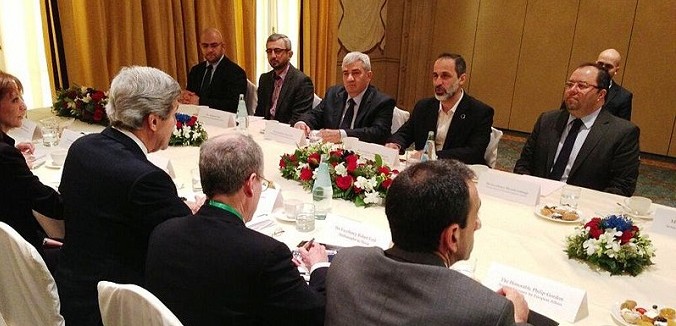The European Union yesterday formally blacklisted the military wing of Hezbollah – the Iran-backed Shiite organization which has been critical in enabling the Bashar al-Assad regime to steadily erode two years of opposition gains – as a terror organization. The Western-backed umbrella group representing the rebels evaluated the decision and declared it a good start:
Syria’s main Western-backed opposition group has welcomed an EU decision to place the military wing of Hezbollah on the bloc’s terror list, calling it a “step in the right direction.” In a statement issued Tuesday, the Syrian National Coalition group also calls for leaders of the Lebanese Shiite militant group to be put on trial for their role in the Syrian war.
The SNC’s stance, which rejects the E.U.’s distinction between political and military Hezbollah officials, echos statements made by Hezbollah leaders and assessments issued by the American intelligence community.
Iran and Hezbollah both blasted the partial designation, with Hezbollah going so far as to threaten European interests.
The Bulgarian government’s investigation into the July 2012 Burgas, Bulgaria bombing – which killed five Israelis and a Bulgarian – reportedly uncovered overwhelming evidence linking Hezbollah to terror attacks on the Continent and globally:
One key piece of evidence was the large number of phone calls between Burgas and various locations in Lebanon associated with Hezbollah, including calls from phone numbers known to belong to Hezbollah operatives. Another was the forged American driver’s license used by one member of the three-man cell, which was traced back to a Beirut printer affiliated with Hezbollah.
The smoking gun, though, was the bomb’s composition, including the specific type of plastic explosive used – which proved identical to the composition of 24 bombs discovered by Israeli security services in Nazareth in August 2012. These bombs had been smuggled into the country at Hezbollah’s behest by a group of drug smugglers. Later, the bomb’s composition also proved an exact match to bombs discovered by Thailand’s security services in January 2012, at a warehouse owned by a Hezbollah operative in Bangkok.
[Photo: RogDel / Wiki Commons]




